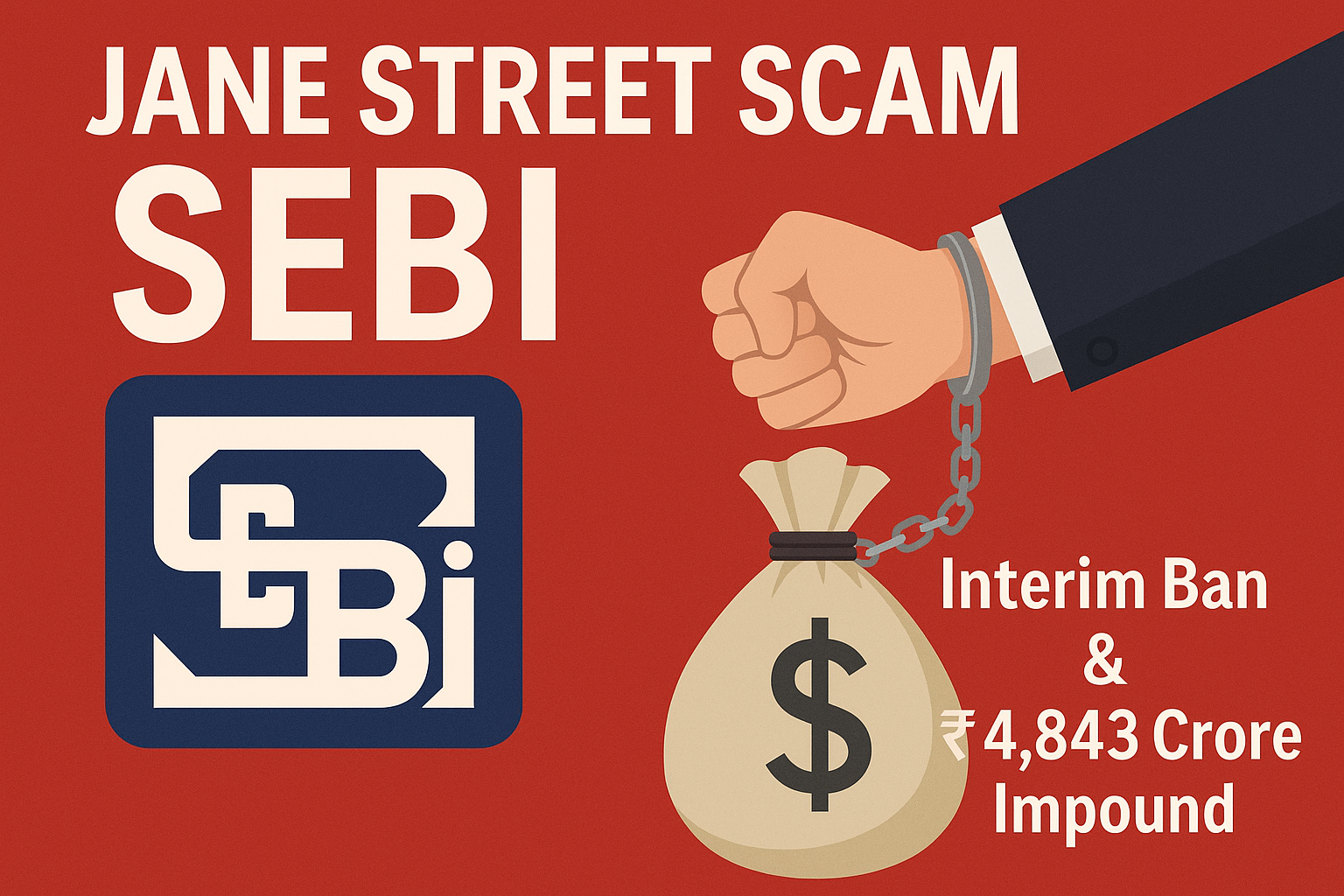In a landmark enforcement action, the Securities and Exchange Board of India (SEBI) has barred the U.S.-based Jane Street Group and its associated entities from India’s securities markets. The July 3, 2025, interim order alleges manipulation of index derivatives during expiry-day sessions—specifically in Bank Nifty and Nifty 50. SEBI has impounded ₹4,843 crore in alleged unlawful gains.
This development sends a clear message: market integrity is non-negotiable.
📅 Timeline of Events
| Date/Period | Key Events |
|---|---|
| Jan 2023 – Mar 2025 | Jane Street’s Indian arm allegedly amassed ₹36,500 crore in Bank Nifty trades. |
| Jan 17, 2024 | One-day gain of ₹735 crore on expiry trade raises red flags. |
| Apr – Aug 2024 | SEBI and NSE issue cautionary letters regarding suspicious activity. |
| Feb 2025 | Jane Street continues similar trades despite alerts. |
| July 3, 2025 | SEBI issues interim ban, freezes ₹4,843 crore in alleged gains. |
Source: New Indian Express
🧠 How the Alleged Manipulation Worked
Jane Street is accused of manipulating the market through a pump-and-dump-like strategy:
- Inflating Index Stocks: Large, coordinated buy orders pushed up Bank Nifty constituent prices on expiry mornings.
- Profiting on Options: Simultaneously holding short positions on inflated options led to gains as prices corrected.
- 21 Expiry Days: The scheme was allegedly repeated over 21 expiry sessions between 2023 and 2025.
This action distorted the natural price discovery mechanism, misleading both retail and institutional investors.
SEBI Observation: “Such coordinated activity was not based on fundamentals or technical rationale.”
— SEBI Interim Order, July 2025
⚖️ SEBI’s Legal Framework for the Action
SEBI exercised powers under the following provisions:
- SEBI Act, 1992: Sections 11(1), 11(4), 11B(1), and 11D
- Prohibition of Fraudulent and Unfair Trade Practices (PFUTP) regulations
- Interim relief: ₹4,843 crore impounded
SEBI Chair Tuhin Kanta Pandey affirmed that “market manipulation will not be tolerated at any cost.”
Reference: Mint
🧾 Impact on Retail Investors
- Sentiment Manipulation: Retail investors may have entered the market based on misleading price movements.
- Loss Statistics: SEBI data shows 93% of retail options traders incur losses annually, averaging ₹1.25 lakh per person.
- Expiry-day Volatility: These trades artificially created volatility and liquidity mispricing.
🛡️ What Comes Next?
SEBI’s probe is ongoing, and more entities could come under scrutiny. Expected developments include:
- Final enforcement order within 6–12 months
- Stricter surveillance of derivatives markets
- Potential regulatory reforms on:
- Expiry-day margin requirements
- FPI transparency
- Real-time pattern recognition tools
Reference: Economic Times
🔗 Authoritative Sources
- SEBI Interim Order, July 3, 2025 – SEBI.gov.in
- Coverage by New Indian Express
- Investor alerts by Mint
✍️ Conclusion
The Jane Street case could become a landmark in SEBI’s regulatory history—signaling that even global giants are not above scrutiny. For retail traders and institutions alike, this is a call to strengthen risk frameworks, demand market transparency, and ensure compliance with ethical trading norms.
want to read more , click here






Your blog is a beacon of light in the often murky waters of online content. Your thoughtful analysis and insightful commentary never fail to leave a lasting impression. Keep up the amazing work!
My brother suggested I might like this blog He was totally right This post actually made my day You can not imagine simply how much time I had spent for this info Thanks
obviously like your website but you need to test the spelling on quite a few of your posts Several of them are rife with spelling problems and I to find it very troublesome to inform the reality on the other hand Ill certainly come back again
Your blog is a breath of fresh air in the often mundane world of online content. Your unique perspective and engaging writing style never fail to leave a lasting impression. Thank you for sharing your insights with us.
Nice blog here Also your site loads up very fast What host are you using Can I get your affiliate link to your host I wish my site loaded up as quickly as yours lol
I’ve been following your blog for quite some time now, and I’m continually impressed by the quality of your content. Your ability to blend information with entertainment is truly commendable.
Somebody essentially lend a hand to make significantly articles Id state That is the very first time I frequented your website page and up to now I surprised with the research you made to make this actual submit amazing Wonderful task
Your blog is a testament to your passion for your subject matter. Your enthusiasm is infectious, and it’s clear that you put your heart and soul into every post. Keep up the fantastic work!
Wow wonderful blog layout How long have you been blogging for you make blogging look easy The overall look of your site is great as well as the content
Your ability to distill complex concepts into digestible nuggets of wisdom is truly remarkable. I always come away from your blog feeling enlightened and inspired. Keep up the phenomenal work!
Your blog is a beacon of light in the often murky waters of online content. Your thoughtful analysis and insightful commentary never fail to leave a lasting impression. Keep up the amazing work!